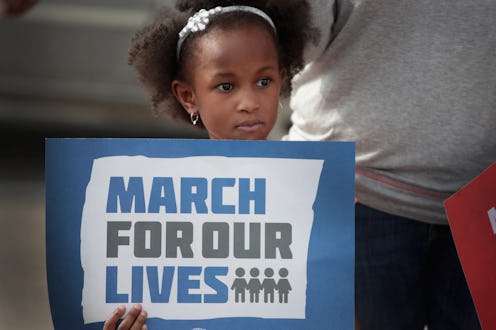News
We Must Talk About Gun Violence Through An Intersectional Lens

On Feb. 14 this year, 17 students were killed in a massacre at Marjory Stoneman Douglas High in Parkland, Florida. It was a senseless act. It could have been avoided.
One month later, 2.7 million students walked out of classrooms across the nation in solidarity with the students of Parkland and victims of all forms of gun violence. Just a few days after that, Stephon Clark was gunned down in his grandmother's backyard by two Sacramento police officers. Twenty shots were fired.
On March 24, hundreds of thousands of young people and allies joined to take part in March for Our Lives in Washington, D.C. and across the nation. And on April 5, Saheed Vassel, a black man, was shot dead by police in Brooklyn, New York.
It is critical that we recognize and address gun violence as a public health issue.
Each and every day in America, 318 people are shot in murders, assaults, suicides, suicide attempts, unintentional shootings, and police-involved shootings.
In my 17 years, I have come to realize that this country is plagued by a disease coined “gun violence.” I use the word “disease” deliberately; it is critical that we recognize and address gun violence as a public health issue.
As a national youth organizer for Women’s March Youth EMPOWER, I have had the honor of listening to the stories of my peers. These conversations have reinforced how imperative it is to talk about gun violence through an intersectional lens. From black, brown, and native communities being continually terrorized by state-sanctioned gun violence and unwarranted police violence, to the women who fall victim to domestic gun violence, all Americans and American values are being threatened.
These past two months in America reminded the world that young people are a powerful force. We’ve captured the attention of mainstream media and our elected officials. And we expect Congress and other elected officials to hear us and take prompt action to address gun violence.
It is important we don’t dismiss the state-sanctioned gun violence that disproportionately impacts black and brown communities.
Here's my fear: that our energy and determination will result in well-meaning officials passing legislation that does more harm than good. If we neglect the intersections of race, gender, and socioeconomic factors, we will see solutions that look like this: arming teachers; instilling more police in schools; and further stigmatizing mental health issues.
We have to address that the issue is much more complex than that. We have to stop picking convenient scapegoats and actually invest time into research.
Which brings me to: What can we do?
First, we need to repeal the Dickey Amendment. This was added as a rider to a spending bill in 1996 and states “none of the funds made available for injury prevention and control at the Centers for Disease Control and Prevention (CDC) may be used to advocate or promote gun control."
Community police departments should not be be armed militias.
We also need Congress to enact an immediate resolution declaring gun violence a public health crisis. In doing so, federal funding can be immediately allocated to research, violence intervention programs, and counseling programs in our schools and communities.
Second, we need to ban assault weapons and high-capacity magazines. There is a huge difference between needing a firearm for protection and wanting to intimidate others. These weapons only serve one purpose: to kill.
And I can’t talk about banning weapons from civilians and not address law enforcement. It is important we don’t dismiss the state-sanctioned gun violence that disproportionately impacts black and brown communities. Congress needs to pass the Stop Militarizing Law Enforcement Act. Community police departments should not be be armed militias.
Perhaps most importantly, we need to vote. (To register to vote, you can text P2P to 788-683.) We need to show up to the polls this November to hold our elected officials accountable for their actions, and inaction. We need to vote in those who uphold values that keep us safe, and vote out those who don’t.
I have nothing but hope that Generation Z will get the work done, and be the leaders that we’ve been waiting for.